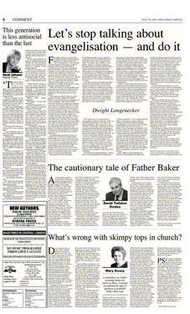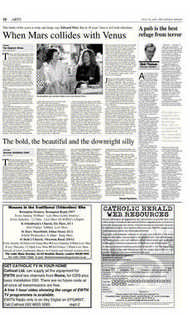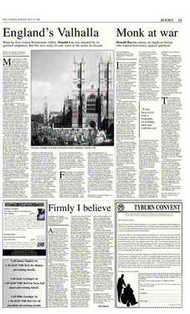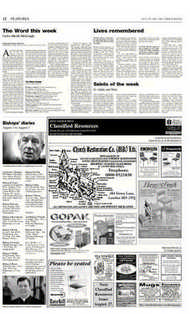Page 1, 30th July 2004
Page 1

Report an error
Noticed an error on this page?If you've noticed an error in this article please click here to report it.
Tags
Share
Related articles
Vatican To Rule On Aids And Condoms
There Is No Plan To Legitimise Condom Use, Says Cardinal
Cardinal Clashes With Tony Blair Over Condom Use In Fight...
Condoms ‘not Justified In Fight Against Aids’
'we Are Winning The Argument On Condoms'
The Cardinal comes out fighting
BY FREDDY GRAY
THE CATHOLIC Church could ordain married men “any time in the next papacy”, and the use of condoms can be acceptable for people suffering from Aids, Cardinal Cormac Murphy-O’Connor has said in his most revealing interview since he became spiritual leader of Catholics in England and Wales four years ago.
In a long and wide-ranging discussion, published this week in The Independent newspaper, he faced tough questions from a lapsed Catholic, John Walsh. His answers shed light on what the Cardinal feels personally about a range of contentious moral and political issues.
On the possibility of permitting married priests, the Cardinal said that the Church had already shown some flexibility. He pointed out that there were married priests in the early Church, and that today there are married former Anglican priests who have converted to Catholicism and remained in orders.
“So, if you’re asking ‘Can the Church change its laws about celibacy?’ then the answer is ‘yes’, any time in the next papacy,” he said. “My view is that there is a strong case for the ordination of married men — but they have to have been married and brought up a family before they’re ordained.” He added that he did not believe that such a shift in Church policy would arrest the decline in vocations.
Mr Walsh asked if he agreed with his Belgian counterpart, Cardinal Godfried Danneels, who in January this year said that an individual carrying the Aids virus was morally obliged to use a condom during sexual intercourse.
Cardinal Murphy-O’Connor replied: “First, I’d like to say that it is right for the Church to preach chastity, that sexual intercourse is for within marriage. But God knows, people just do not live up to ideals. While we can say that, objectively, the use of condoms is wrong, there are places when it might be licit, or allowable, as when there’s a danger of intercourse leading to death. It would be wrong to take a special case and make it a universal law.
“There is such a thing as universal morality, where things are either right or wrong; but there are also subjective matters that affect whether a thing is slightly wrong or not wrong at all. That’s what we are talking about in this case. So I would agree with Cardinal Danneels’s position.” The Cardinal was less flexible when asked about the ordination of women. He replied that he thought the issue of women priests was different from that of married priests because the former was a matter of “discipline” while the latter was “a tradition, or doctrine”.
“The reason why the Pope and the bishops say, ‘we can’t have women priests’ is not because we think they’re not equal to men. It is because we have to ask — what is the will of Christ? Is it only to ordain men, as he did with the Apostles? Should that tradition be kept on, or can it be changed due to cultural circumstances? The Pope and the bishops feel that, if we are to be faithful to that tradition, we are not authorised to make that change.” The interview will be read with great interest in Rome. One Vatican official, who did not wish to be named, strongly disagreed with the Cardinal. He said that on the issue of married priests Cardinal Murphy-O’Connor was “absolutely theologically wrong”. He said: “As I understand it, the Holy Father wants all discussion of this stopped. It’s not really open to question at all.” The official also disapproved of the Cardinal’s remarks on condoms and Aids. “[His stance] is not heretical,” he said, “but shows a grave misunderstanding of the responsibilities of a shepherd as common pastor to his flock and to his government in promotion of the common good. This is not a matter of discipline but of doctrine, of moral teaching. It is not subject to subjective analysis. If it’s intrinsically evil, it is intrinsically evil.” The Cardinal’s remarks are bound to provoke reactions from across the wide spectrum of opinions in the Catholic Church, and to highlight tensions between liberals and conservatives.
The Cardinal, however, said that there was no need for such divisions in the face of modern challenges to the Church. “When traditional beliefs are challenged, there is a tendency to go in different directions,” he said. “Either you can become liberal and go along with the way of the world, in order to conform. Or you become ultra-conservative. The genius of the Catholic Church is to do neither. It may appear to have gone conservative, but in fact, it’s only the Church that’s able to keep what’s traditional, to keep the essence of the Christian message, and not retreat behind the walls, saying ‘we want nothing to do with the outside world’.” Daphne Mcleod, of the orthodox group Pro Ecclesia et Pontifice, said: “I am not happy with it [the interview] and I expect the Cardinal is not happy with it either. I feel very sorry for him. I think he needs to be better prepared before interviews to deal with such difficult questions.” On the other hand, Pat Brown, membership secretary of Catholic Women’s Ordination, who disagreed with the Cardinal’s stance on women priests, was pleased with the interview overall: “I quite like the whole tone of it, but it is sad that the entrenched position of the Church makes it very difficult for the Cardinal, who seems like a reasonable man, to defend the Church. What can he say?” The interviewer also asked questions about the political role of the Church. Cardinal Murphy-O’Connor said that the Church should speak out about all political matters that concern social policy, every thing that concerns human dignity, and international affairs, such as aid to the Third World.
He defended the right of the bishops to speak out on contentious political matters such as the European Constitution, as well as expressing his opinion of the war against Iraq.
“The Pope was dead against it, in every way. I was a bit more nuanced, but I was certainly not in favour of it,” he said.
The discussion moved on to the subject of whether Catholic clergy should refuse Communion to public figures who support abortion. The Cardinal said that the administration of the sacrament should not be a matter for public dispute. “I don’t think coercion is helpful in changing people’s minds,” he explained.
Sir Stephen Wall, director of the Cardinal’s press office, said that the Archbishop was pleased with the published interview.
Meanwhile, Cardinal Danneels this week repeated his controversial stance on the use of condoms in an interview with Briefing, the official magazine of the Bishops’ Conference of England and Wales. The Belgian cardinal said he supported Humanae Vitae, the 1968 encyclical by Pope Paul VI which forbade the use of contraception, but he said it was a “prophetic document” which would only be realised in future years.
blog comments powered by Disqus















